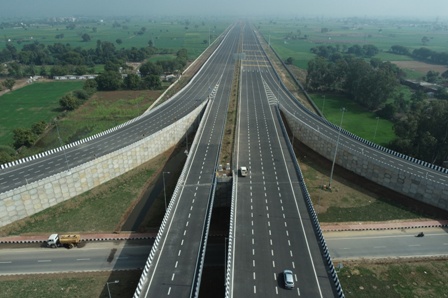PM Modi Dedicates Delhi-Dausa-Lalsot Expressway in Dausa, Rajasthan
Delhi Mumbai Expressway is one of the most advanced expressways in the world which presents a grand picture of developing India.
The 246 km segment of the Delhi Mumbai Expressway that runs from Delhi to Dausa to Lalsot was dedicated to the nation today by Prime Minister Shri Narendra Modi. Additionally, he laid the cornerstone for 247 kilometres of National Highway projects that will cost more than Rs 5940 crore to construct. Several world-class Expressways are being built around the nation, bringing to fruition the Prime Minister’s emphasis on creating good road infrastructure as an engine of growth, development, and connectivity in New India.
dedicated to the nation today by Prime Minister Shri Narendra Modi. Additionally, he laid the cornerstone for 247 kilometres of National Highway projects that will cost more than Rs 5940 crore to construct. Several world-class Expressways are being built around the nation, bringing to fruition the Prime Minister’s emphasis on creating good road infrastructure as an engine of growth, development, and connectivity in New India.
The first section of the Delhi-Mumbai Expressway was dedicated to the country. The Prime Minister told the crowd. He emphasised that this motorway is among the most modern in the world and paints a great image of India’s development.
The prime minister has emphasised the multiplier effect of infrastructure investment on the nation’s development. Rajasthan’s poor and middle class will profit from the provision of 10 lakh crores for infrastructure in this year’s budget. He also emphasised the advantages of infrastructure spending for the economy, such as connectivity and job creation. Along with many other Delhi, Haryana, Gujarat, and Maharashtra regions, Rajasthan would gain greatly from the Delhi-Mumbai Expressway and tourist destinations like Sariska, Keoladeo National Park, Ranthambore, and Jaipur. The Prime Minister stated that one of the three more projects would directly connect Jaipur to the highway. In close proximity to Alwar, the second project will link the motorway to the Ambala-Kotputli route. Vehicles travelling to Punjab, Gujarat, Madhya Pradesh, and Maharashtra from Haryana, Punjab, Himachal, and Jammu & Kashmir will benefit from this. The region will also be connected to the Expressway by the Lalsot Karoli route.
The Delhi-Mumbai Expressway and the Western Dedicated Freight Corridor, which the prime minister emphasised will revolutionise this entire region, including Rajasthan, in the next years, will become two powerful foundations of progress for Rajasthan and the country. He pointed out that the road and freight corridor will link several parts of Rajasthan, Haryana, and Western India with ports, strengthening the Mumbai-Delhi Economic Corridor. He claimed it would also open up new prospects for transportation, storage, and logistics.
The Prime Minister stated that plans had been made to build optical fibre, electrical lines, and gas pipes, and the leftover land would be used for producing solar energy and warehousing purposes. He also emphasised that the PM Gati Shakti Masterplan powers the Delhi-Mumbai Expressway. The Prime Minister said, “These initiatives will result in significant future financial savings for the country.
The Prime Minister added, “The government’s resolve is to make a competent, capable, and successful India”, as he emphasised the motto of “Sabka Saath, Sabka Vikas” for Rajasthan and the country.
Among those present at the event was PWD Minister of the Rajasthan Government, Shri Bhajanlal Jatav, PWD Minister of the Union for Road, Transport and Highways, Shri Nitin Gadkari, Union Minister for Jal Shakti, Shri Gajendra Singh Shekhawat, Union Minister of State for Agriculture and Farmers’ Welfare, Shri Kailash Choudary, and Members of Parliament.
The Delhi Mumbai Expressway’s 246 km Delhi – Dausa – Lalsot stretch was built for more than Rs 12,150 crore. This segment will significantly speed up the economic growth of the entire region and cut the travel time from Delhi to Jaipur from five hours to roughly three and a half. With a length of 1,386 km, the Expressway will be the longest motorway in India and cut the distance and travel time between Delhi and Mumbai in half. It will connect important cities like Kota, Indore, Jaipur, Bhopal, Vadodara, and Surat while traversing six states. During the event, the Prime Minister also laid the cornerstone for 247 kilometres of National Highway projects, including a 67-kilometre-long four-lane spur road and a two-kilometre-long paved shoulder on the Lalsot-Karoli segment.
